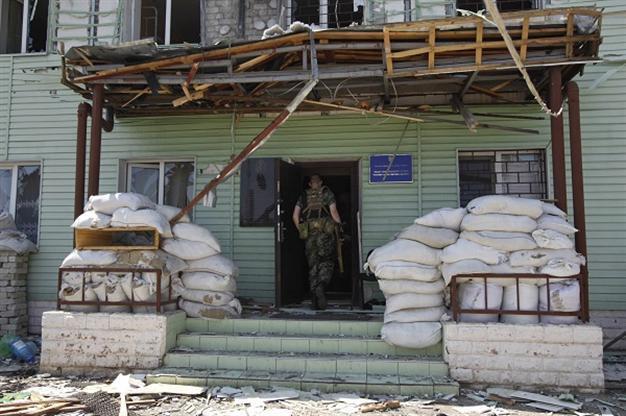Donetsk rebels 'surrounded,' as 13 troops killed
DONETSK

A Ukrainian border guard walks into the headquarters of a local Ukrainian frontier guard detached unit, which according to Ukrainian servicemen, was attacked by weapons fired from the territory of Russia, in the town of Milove, Luhansk Region August 8, 2014. REUTERS/Valentyn Ogirenko
A top commander of the pro-Russia insurgency in eastern Ukraine said August 9 that Ukrainian forces have seized a key town, leaving the rebel region’s largest city of Donetsk surrounded.The statement by Igor Girkin, a former Russian special service officer better known by his nom de guerre of Strelkov, appears to be a significant admission by the rebels that Ukrainian forces are gaining the upper hand in the four-month-old fight.
Strelkov said the town of Krasnyi Luch, which lies on one of the two main roads between Donetsk and the rebel-held east’s other main city of Luhansk, "has been taken by the enemy."
"The Donetsk-Horlivka group of the fighters of Novorossiya is completely surrounded," he said on a rebel social media page. Novosrossiya, or New Russia, is a term widely used for the rebel region.
A spokesman for the Ukrainian military operation, Andriy Lysenko, told reporters August 9 that he could not confirm the claim that Krasnyi Luch was under the forces’ control.
In Donetsk, a spokesman for the city administration said at least one person was killed and several injured in shelling of the city’s southern area on August 9. Spokesman Maxim Rovninsky also told The Associated Press that about 30 apartment blocks came under fire during the night.
The city, whose population was nearly 1 million before the fighting, has increasingly come under fire over the past weeks. Ukrainian officials firmly deny that they are shelling civilians, but rebels claim the forces are doing just that and trying to shift blame to the separatists.
Fighting with pro-Russian separatists in eastern Ukraine has left 13 troops dead in the last 24 hours, Ukraine’s military said August 9.
"Over the past day, 13 of our guys were killed during the liberation of Ukraine," National Security and Defense Council spokesman Andriy Lysenko said, as Kiev’s forces attempt to retake rebel strongholds in the east and cut them off from the Russian border.
As the fighting proceeds, concerns are rising about a looming humanitarian catastrophe in Luhansk, where fighting has been heavier and more prolonged.
Russian news agencies quoted a August 9 statement from the Luhansk city administration saying that the city has been without water and electricity for a week and that most of its stores are closed.
Russia has been pushing for a humanitarian mission to Luhansk, but Kiev and Western countries suspect that could be a pretext for sending in troops. Western countries say Russia has assembled some 20,000 troops just across the border.
The International Committee of the Red Cross said August 8 that it is stepping up work to alleviate the crisis. In a statement, it acknowledged the Russian proposal about organizing aid convoys and said "any humanitarian initiative is welcome" but added that any Red Cross "action will be taken in strict adherence to our fundamental working principles of neutrality, impartiality, and independence.."
In Kiev, city workers and volunteers on August 9 removed the last of the barricades that had blocked the main street of Ukraine’s capital since protests that forced a change of government arose late last year.
Protesters erected the barricades to protect a sprawling tent camp on the central city’s main square. Although the camp’s size dwindled sharply after President Viktor Yanukovych fled the country in February and a new government came to power, a determined core of demonstrators remained in a show of suspicion of the new authorities.
Some tents remained on Saturday. But Kiev mayor Vitali Klitschko, who was one of the leaders of the protests against Yanukovych, was quoted by Ukrainian media as saying an agreement has been reached with the protest holdouts to restore free movement in the center.
Yanukovych’s ouster precipitated the crisis in Ukraine’s east, which was his support base and where many were opposed to the new authorities, calling them nationalists with fascist leanings who intended to oppress the largely Russian-speaking east.
















